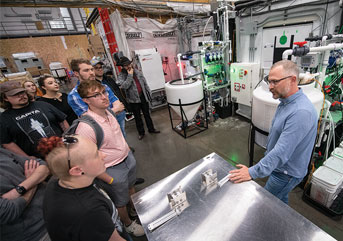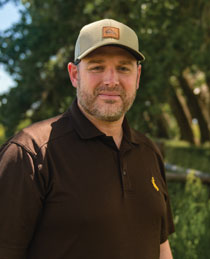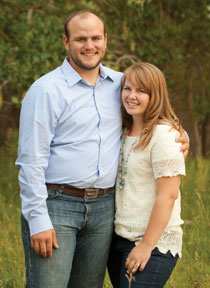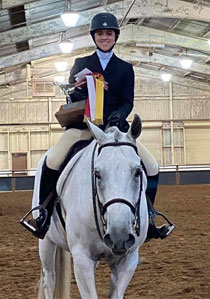
Contact Us
Institutional Communications
Bureau of Mines Building, Room 137
Laramie, WY 82071
Phone: (307) 766-2929
Email: cbaldwin@uwyo.edu
Agriculture and Beyond
Published September 18, 2023

Nate Storey talks about sustainable agriculture to a group of students in UW’s
Innovate Wyoming course.
UW’s College of Agriculture, Life Sciences and Natural Resources graduates power a wide variety of industries in the state, from health care to innovation.
By Micaela Myers
Growing Indoor Agriculture
When Nate Storey was a graduate student at UW, he co-founded the indoor vertical farm company Bright Agrotech and established an innovation center in Laramie. In 2014, Storey and a group of entrepreneurs went on to create Plenty Unlimited, which bought Bright Agrotech. Today, Plenty has more than 400 employees nationwide, with Storey serving as chief science officer. In the past two years alone, Plenty’s research and development has driven more than 100 new patent filings for innovations as diverse as new crop growing systems, a way to detect plant stress and new tomato plant varieties.
That innovation is now helping to diversify Wyoming’s economy. A $20 million grant from the Wyoming Business Council to the city of Laramie will aid the construction and infrastructure costs for a 60,000-square-foot facility to be built on 16 acres at the Cirrus Sky Technology Park. Set to open in 2025, the project will support the retention and creation of nearly 200 high-paying jobs in the community.
To create synergies in the field and help produce a trained workforce, UW launched a Controlled Environment Agriculture Center as part of the Science Initiative. Controlled environment agriculture requires finely controlled environmental parameters such as humidity, light, temperature and carbon dioxide to create optimal growing conditions for maximal yield. The many areas for potential study include plant nutrition and physiology, breeding and selection of plants, plant-microbe interactions, fresh produce safety, robotics and automation, sensors and imaging tools, engineering for light production, supply chain management, and economic analysis for profit maximization. The Controlled Environment Agriculture Center will have a strong virtual component as well to allow collaborations with researchers at Wyoming’s community colleges and around the state.
“This is an exciting new industry that has tremendous potential to boost Wyoming’s economy, diversify the state’s important agriculture industry and drive job creation and innovation,” UW President Ed Seidel says. “Our new Controlled Environment Agriculture Center is poised to become a destination for research, training and workforce development in this rapidly growing sector in the fresh produce industry.”
Casey Seals, Senior Manager, Experiments and Systems at Plenty
Casey Seals grew up in Cheyenne and earned his degrees from UW in agroecology (B.S. 2005) and agronomy and horticulture (M.S. 2016). Based in Laramie, he serves as senior manager for experiments and systems at Plenty, where he is responsible for leading crop optimization research and steering plants to maximum yield and quality through numerous growth parameter management strategies.
Seals attended UW with Plenty’s co-founder, Nate Storey. “The plant science program gave us both the foundational knowledge and experience to become highly successful in a plant science and agricultural profession,” he says. “The vertical farming industry is picking up pace and becoming a viable and economical alternative to producing high-value field crops. What excites me about this industry is that our company, Plenty, is rewriting the rules of agriculture with indoor vertical farms that grow fresh, flavorful, pesticide-free greens — all the while using just a fraction of the water and land compared to conventional farms. Financial and governmental support allocated from the state of Wyoming have allowed us to begin designing the future construction of the world’s largest vertical farming research center right here in Laramie. Our partnerships with UW will assist in the hiring and curation of talented individuals with controlled environment agriculture knowledge to support our workforce, provide research streams beneficial to both organizations via strong analytical science applications, and cultivate relationships that will accelerate the momentum of learning for students and industry. I am honored to have received my formal education from UW and have applied those learnings to become a part of an agricultural revolution that will enhance how we feed future world populations with fresh nutritious produce.”
Jennifer Hess, HWA Wildlife Consulting
Jenn Hess took a field job in Buffalo in 2003 and fell in love with Wyoming. She then earned her master’s degree in rangeland ecology and watershed management (2011). After graduation, Hess was hired on at Laramie’s HWA Wildlife Consulting LLC, where she now serves as senior ecologist and co-owner.
“I have been able to work across the western U.S. focused on wildlife and vegetation monitoring for areas of potential development,” Hess says. “I’ve learned how to conduct noise monitoring, flown in helicopters and fixed-wing aircraft to survey for various wildlife, trapped greater sage grouse and sharp-tailed grouse, banded ferruginous hawks and managed the company’s data, among many other tasks. I know I am lucky to have found a role that constantly challenges me while also allowing me to grow and improve.”
Hess credits her rigorous UW coursework for preparing her for the role and is grateful to live in Wyoming.
“I absolutely love the outdoors. I mountain bike, hike, ski, snowboard, skate, cross-country ski and take my dog on adventures,” she says. “There are so many amazing places to explore. And as someone who has moved over 25 times before landing in Laramie, I think this is one of the friendliest places. I never really felt at home anywhere before moving here.”

Noah Hull at the Cheyenne Arboretum.
Noah Hull, Association of Public Health Laboratories
Noah Hull played a key role in Wyoming’s COVID-19 response. Luckily for the state, UW drew him here and taught him the skills necessary to respond to the outbreak.
Hull grew up in Los Angeles and visited relatives in Cheyenne regularly. When it came time for college, Hull chose UW, earning his bachelor’s degree in molecular biology (2012) and Ph.D. in veterinary sciences (2017) with a concentration in infectious disease epidemiology and molecular diagnostics. As an undergrad, he participated in student government and undergraduate research in UW’s state-of-the-art facilities. Hull also met his wife, Ashley Smith, at UW.
In 2018, Hull took a position as the microbiology manager at the Wyoming Department of Health’s Wyoming Public Health Laboratory (WPHL). There, he oversaw all infectious disease testing. When the pandemic hit in 2020, WPHL was, at first, the only lab capable of testing samples for SARS-CoV-2.
“My ties to UW paid off,” Hull says. “We were able to hire current and recent graduates at the WPHL. We also worked with several researchers at UW.”
In 2021, Hull joined the Association of Public Health Laboratories as the laboratory technical manager for next-generation sequencing, bioinformatics and wastewater-based surveillance projects there.
“We work in over 62 countries,” Hull says. “When I first started, we were focused on COVID-19, but this has pivoted to pandemic preparedness, antimicrobial resistance, viral hemorrhagic fevers and other communicable diseases. I travel about 50 percent of the time, go to some amazing places and apply the skills I developed at UW to assist with public health problems worldwide.”
When not traveling, he’s still based in Wyoming, where he loves the outdoors opportunities and friendly people. “People in Wyoming are, at their core, dedicated to each other,” he says. “I have lived in California, Colorado, Alabama, Virginia, Washington, D.C., and Maryland — but nothing beats Wyoming. You can participate in government here and work in a job that has meaningful and evident impacts on people’s lives.”

Jared and Renee Asay (Courtesy photo)
Jared Asay, Big Horn Co-op
Jared Asay and his wife grew up in the Big Horn Basin and dreamed of living and working close to home. After graduating with his degree in agroecology (2016), that dream came true. Asay works as a crop adviser for Big Horn Co-op.
“I get to do a mix of offering agronomic advice, field scouting and sales of fertilizer, seed and crop protection products,” he says. “I enjoy the daily interaction with producers and the opportunity to do something different every day.”
Asay says UW’s professors and advisers took an interest in his goals and continue to be a resource for him today. He also greatly benefited from a summer internship he found through UW’s internship fair — a resource he encourages other students to utilize. “Take advantage of internship opportunities and cultivate relationships with professionals in your chosen field,” Asay says.
He loves learning new things each day and appreciates living and working in Wyoming. “I love the small close-knit community that I get to live and raise my family in and the good people that I’m surrounded by.”
Elly Wurdeman, The Insurance Corners
It’s always inspirational to hear of graduates who go on to create businesses and provide jobs right here in Wyoming. That’s just what Elly Wurdeman of Lusk did after earning her agricultural business degree in 2005.
“As owner of The Insurance Corners of Wyoming, I currently have agency offices in Casper, Douglas and Lusk,” she says. “My current focus is on the day-to-day operations of running the agencies. I am also an active agent with a focus in farm and ranch and commercial insurance for Converse and Niobrara counties and surrounding areas.”
Her degree provided the skillset to own her own business, the knowledge to keep her own books and — perhaps more importantly — lifelong connections.
Wurdeman loves life in Wyoming, complete with low crime and a high quality of life. “We have the ability to fail or make it,” she says. “There are far less restrictions and taxes in Wyoming and less government controls for business. Our kids are able to go to fairs, play outdoors, ride their bikes and horses. Our kids get a chance to be kids and enjoy our Western lifestyle.”
Amber Armajo, 4-H – Virtual Career Night
The annual WESTI (University of Wyoming Extension’s Strategically and Technologically Informative) Ag Days have taken place for more than 30 years in Washakie County with guest speakers on agricultural topics and a trade show. Before the pandemic, a career night for 4-H students was part of the annual event. One year, Washakie County Extension 4-H and Youth Educator Amber Armajo saw a young man attend who had no idea what he wanted to do with his life. He met an electrician and decided to become one himself. Stories like that made Armajo, a Wyoming native and UW graduate, know the event was important.
When the pandemic hit, Armajo and her colleagues decided to make it virtual. It was a huge success, with 24 careers represented. This year, organizers even featured celebrity Ryan “Cal” Callaghan from the Netflix show MeatEater. The recordings are still available for anyone to view at wyoming4h.org/virtual-career-night. Through the event, young people can learn about careers they may never have considered, including many based in Wyoming. Youth from all over the country are now attending.
“We’ve been able to reach a whole lot more kids and highlight a lot more careers virtually,” Armajo says. “Last year, we received the Excellence in Workforce Development Programming Award from the National Association of Extension 4-H Youth Development Professionals. Other states have reached out and want to do something similar.”
Alum Morgan Graham, owner of Unrivaled Show Horses and member of the Army National Guard
 Morgan Graham (Courtesy photo)
Morgan Graham (Courtesy photo)
For the past decade, Morgan Graham of Cheyenne has served in the Army National Guard as a UH-60 Blackhawk helicopter mechanic. She also runs Unrivaled Show Horses, a small American Quarter Horse breeding business.
“Showing horses has always been my passion, and it is so much more satisfying when doing so on a horse that I produced,” Graham says.
Despite her hectic military and business schedule, she earned her bachelor’s degree in animal science with a concentration in pre-veterinary science from UW in 2021.
“When I returned from my second deployment in 2017, I decided to put my head down and just get it done,” Graham says. “I continued to work while attending school and was able to graduate just before leaving for my most recent deployment.”
She loves living near family in Wyoming as well near her extended military family. Graham says, “The culture here fits my way of life, as we are gritty and highly independent.”
Workforce Development for Weed and Pest
Whether you enjoy hunting, fishing or other types of recreation, or work in agriculture, all of us depend on healthy soils, livestock and wildlife, which in turn require healthy native plant communities. However, those native communities are threatened by invasive noxious weeds and pests. The Wyoming Weed and Pest Council is composed of 23 districts throughout Wyoming. The council works closely with the Wyoming Department of Agriculture and UW to keep current on the latest technology and research.
“I truly believe that we have one of the most progressive and educated weed and pest communities in the country,” says UW Plant Sciences Department Head and Professor of Weed Science Andrew Kniss. “In part, that’s because the weed and pest districts have a rigorous certification program required by all county weed and pest district supervisors.”
These weed and pest employees take courses through UW’s Department of Plant Sciences and Department of Ecosystem Science and Management. In addition, UW graduates of these programs are often hired by the districts.
Kniss used to offer his weed science course separately for UW students and weed science professionals, but he’s found a combined option offers great synergies.
“I think it’s been exceptionally successful because now our on-campus students get the opportunity to interact with actual working professionals in the state,” he says. “The folks who are out working on these problems are enrolling in the same rigorous college course as the on-campus students.”
Another partnership that includes UW and the weed and pest districts is Wyoming’s new Institute for Managing Annual Grasses Invading Natural Ecosystems (IMAGINE). IMAGINE’s purpose is to develop long-term strategies for invasive grass management on a landscape scale while empowering local decision makers. Learn more at uwagnews.com/institute-for-managing-annual-grasses-invading-natural-ecosystems.
The Department of Plant Sciences is also supporting workforce development and continuing education by offering graduate degrees that can be completed at UW’s research and extension centers in Powell, Lingle or Sheridan.
“We saw a need for working professionals who are place-based that would benefit from getting a Master of Science degree,” Kniss says. “We’ve had several students earn their master’s and two earn their Ph.D. without ever setting foot in Laramie. This is a nice tool for the agronomists out there who want to move up but can’t move to Laramie.”
Contact Us
Institutional Communications
Bureau of Mines Building, Room 137
Laramie, WY 82071
Phone: (307) 766-2929
Email: cbaldwin@uwyo.edu


